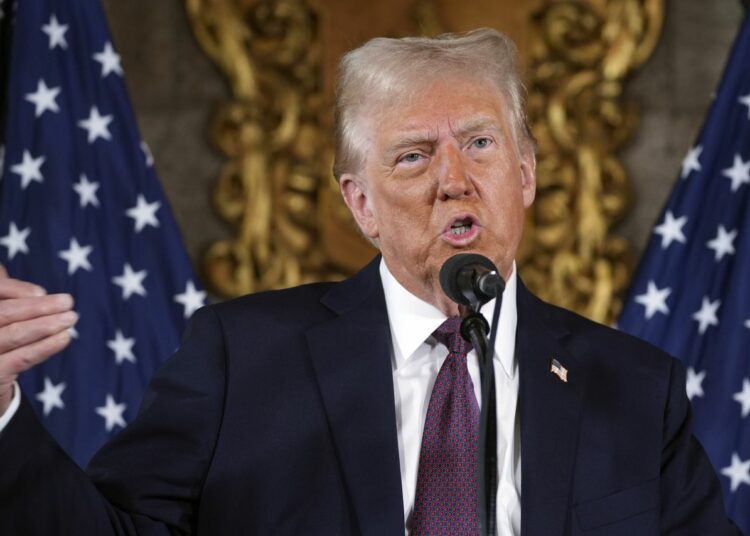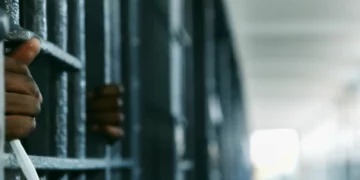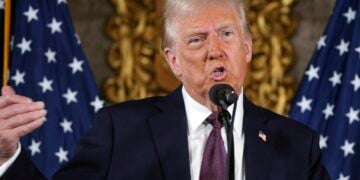United States President Donald Trump has began erasing Joe Biden’s legacies immediately after taking office as the nation’s 47th president on Monday.
Trump pardoned nearly all of his supporters who rioted at the U.S. Capitol on January 6, 2021, issuing a blizzard of executive orders that signal his desire to remake American institutions.
The new American president also used one of the flurry of executive actions that he issued on his first day back in the White House to begin the process of withdrawing the U.S. from the World Health Organisation for the second time in less than five years, a move many scientists fear could roll back decades-long gains made in fighting infectious diseases like AIDS, malaria and tuberculosis.
Experts have also cautioned that withdrawing from the organisation could weaken the world’s defences against dangerous new outbreaks that could trigger pandemics.
During the first Oval Office appearance of his second term, Trump signed an executive order detailing how the withdrawal process might begin.
“Ooh,” Trump exclaimed as he was handed the action to sign. “That’s a big one!”
His move meant pausing the future transfer of U.S. government funds to the organisation, recalling and reassigning federal personnel and contractors working with the WHO and calling on officials to “identify credible and transparent United States and international partners to assume necessary activities previously undertaken by” the organisation.
This is not the first time Trump has tried to sever ties with WHO. In July 2020, several months after WHO declared COVID-19 to be a pandemic and as cases surged globally, Trump’s administration officially notified U.N. Secretary-General Antonio Guterres that the U.S. was planning to pull out of WHO, suspending funding to the agency.
However, President Joe Biden reversed Trump’s decision on his first day in office in January 2021, only to have Trump essentially revive it on his first day back at the White House.
It was an aggressive start for a returning president who feels emboldened and vindicated by his unprecedented political comeback. Four years after being voted out of the White House, Trump has a second chance to launch what he called “a golden age” for the country.
He similarly signed orders for increasing border security, designating drug cartels as foreign terrorist organisations, limiting birthright citizenship, freezing new regulations and establishing a task force for reducing the size of the federal government.
He also rescinded dozens of directives issued by Biden, including those relating to climate change and diversity, equity and inclusion initiatives.
Trump said that walking back into the already-remodelled Oval Office after his inauguration was “one of the better feelings I’ve ever had.” Unlike during his first term, when new staff members scrambled to figure out what exactly their president was trying to achieve, Trump moved rapidly and methodically to advance his agenda on Monday.
His first action after arriving at the White House was pardoning about 1,500 people charged in connection with the January 6 attack, even if they had been convicted of assaulting police officers.
Trump further commuted the sentences of another 14 people, including leaders of the Oath Keepers and the Proud Boys.
The decision amounted to a sweeping cloak of impunity for Trump supporters who upended the country’s tradition of peaceful transfers of power by trying to overturn his election defeat four years ago.
Trump described them as “hostages” and said he expected them to be freed shortly. A crowd gathered outside a Washington, D.C., jail to welcome their release.
Hereunder are some of the actions Trump took on his first day in office:
- Trump announced a pardon for most of those who have been charged in the January 6, 2021, attack on the US Capitol. Trump said his pardons would cover “approximately 1,500 for a pardon – full pardon.”
- Trump signed an executive action that extended the deadline for TikTok’s parent company to find a new owner or face a ban in the US.
- Trump rescinded 78 Biden-era executive actions, including an executive order that required federal agencies to extend prohibitions on sex discrimination; an order that required executive branch appointees to sign an ethics pledge; an order that allowed transgender people to serve in the military; and an order that banned the renewal of private prison contracts.
- Trump declared a national emergency on the southern border, triggering the use of Pentagon resources and personnel that will be deployed and used to build the border wall. His administration also ended use of an app that allows migrants to notify US Customs and Border Protection that they intend to enter the United States. Trump also signed an order that sought to redefine birthright citizenship.
- Trump announced withdrawing the US from the World Health Organisation. His order says the WHO “continues to demand unfairly onerous payments” from the US.
- Trump signed an action enacting a hiring freeze for federal government employees through the executive branch. He also formally established the new Department of Government Efficiency as an entity within the federal government in an executive action.
- Trump took executive action on the names of US landmarks including renaming Denali and the Gulf of Mexico, a move that his White House said will “honor American greatness.”
- Trump signed an action withdrawing the US again from the Paris climate accord, a global emission-lowering agreement.





